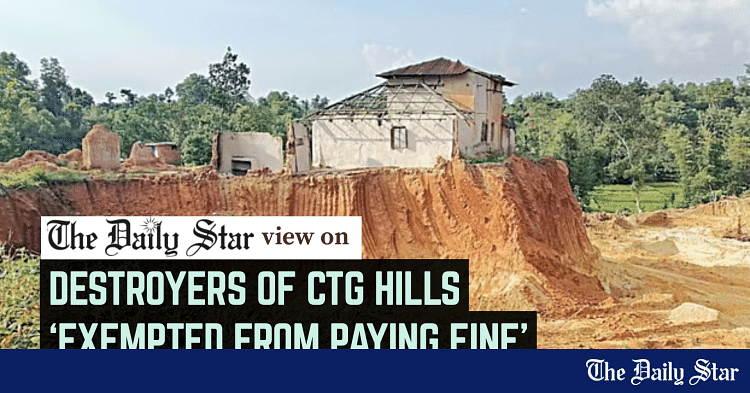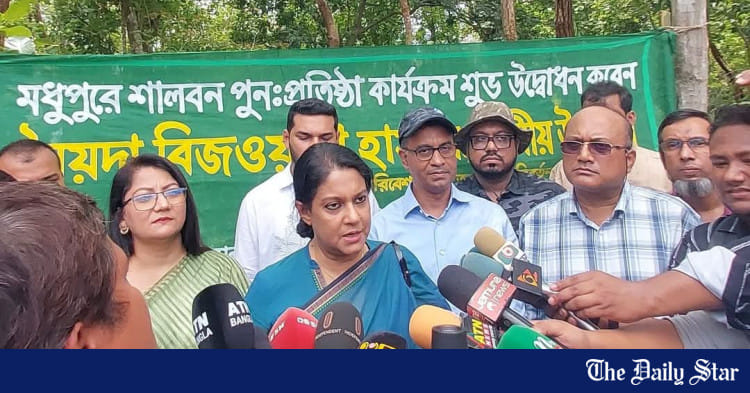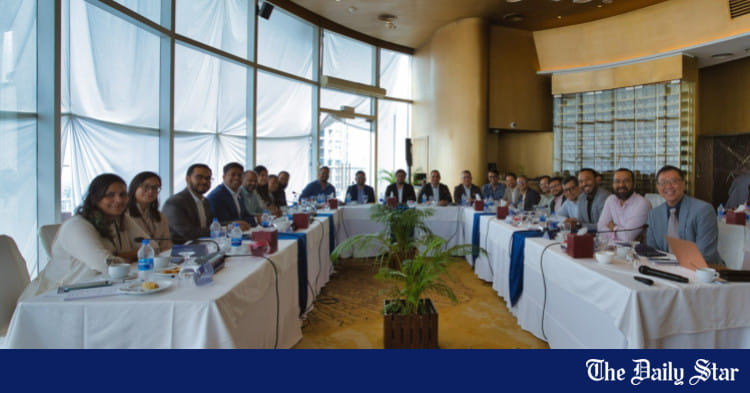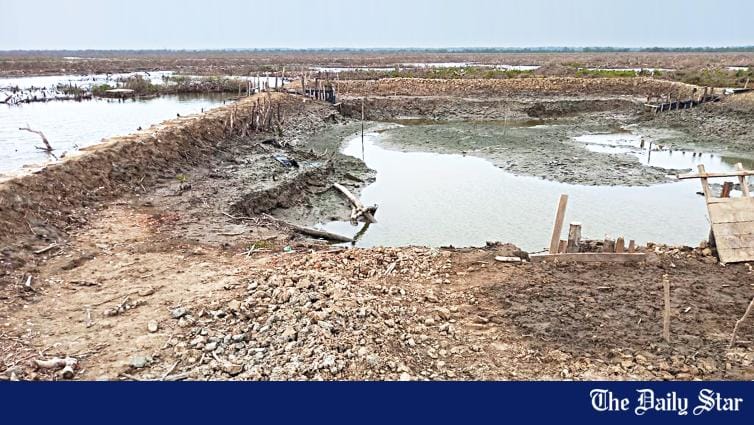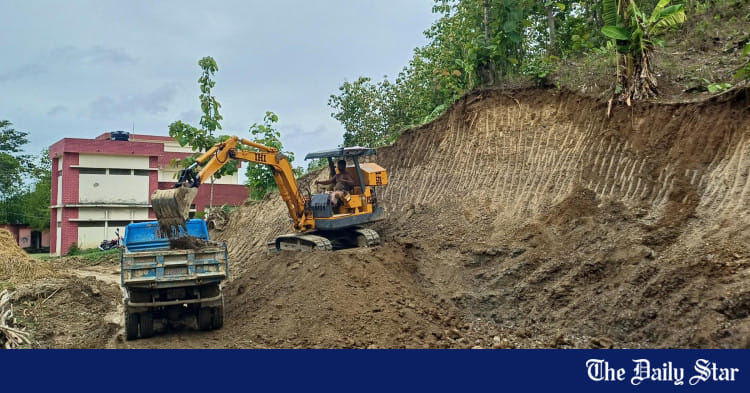Biodiversity threatened by hill agriculture
To survive properly, the first thing we need is to build a close relationship with the environment and maintain a proper balance with it.
Mrityunjoy Roy
Published: 23 May 2025, 17: 20
The soil around the base of teak trees that are highly water absorbent has eroded severely. Photo taken in Dharmaghar area of Kutukchhari in Rangamati Sadar upazila on 20 May 2025. Supriyo Chakma
Although Bangladesh is a small country, there is a lot of diversity here. The country has a particularly rich collection of agricultural and biological diversity. Very few countries in the world have the crop diversity like Bangladesh.
Around 400 different types of crops are cultivated here. And, there are thousands of varieties of these crops. At one time, there were over 12,000 varieties of paddy alone.
Just like crops, there is a wide range of plant diversity as well. The country is home to nearly 6,000 species of flora, 1,600 species of vertebrate, and 2,500 species of invertebrate life-forms. It has not been possible to determine an accurate account of Bangladesh’s biodiversity yet.
The country is also unique in its landform diversity. A vast delta formed with Himalayan silt and crushed rock, Bangladesh has a lot of wetlands, haors (floodplains), highlands, hills along with the sea. On one side there lies the sea-washed coastline with plants, crocodiles, and turtles living in the saline water and soil there.
Meanwhile, about 400 species of freshwater fish and the Gangetic dolphin inhabit the rivers, canals, and wetlands here. Then there is the Sundarbans a mangrove forest on the edge of the sea, which works as a natural protector for us.
The Sundarbans is home to 528 species of plants, 339 species of birds, and about 1,600 other species of wildlife, including microorganisms. On the other hand, Bangladesh’s evergreen and mixed hill forest is a part of the 34 biodiversity hotspots around the world.
There are 1,560 species of flowering plants, including orchids, bamboo, teak, garjan, telsur, and bailam found in the hill forests. Plus, these forests are home to a variety of animals including elephants, leopards, deer, bears, butterflies, lizards, snakes, and different bird species.
Before the 1960s, the hill tracts were lush and full of biodiversity. However, the construction of the Kaptai dam in the 1960s and increased human settlement started cutting down on the greenery.
Similarly, the expansion of tea gardens and crop farming in Sylhet and Moulvibazar led to the destruction of many hill forests. As a result, many of the biodiversity from the hill tracts came under threat while several species disappeared completely.
Plains agriculture creeps up to hills
Our natural hills are no longer retaining their original form. In ancient times, the hill forests were the habitats for flora, thick with large trees covering the slopes in greenery. There was no such human presence there rather they served as a habitat and sanctuaries for the wild animals.
But as the country’s population increased, humans gradually encroached upon these areas. Forests were cleared to build homes, and jhum farming expanded to meet the demand of food.
Traditionally, a particular hill is used for jhum farming only once in a year. After farming on the hill once, the farmers locally known as Jumiya leave that hill fallow before starting cultivation on that land again. Doing jhum farming in this method allows the soil to regain its natural fertility.
Earlier, jhum farming was done on a limited scale. But now, cultivation of a wide range of crops typically grown in the plains is now expanding extensively in the hill tracts overpowering jhum farming.
Nowadays, crops such as bush beans, cabbage, cauliflower, kohlrabi, long beans, tomatoes, coriander, tobacco, sugarcane, and chillies are commercially grown on hill slopes, valleys between slopes, and near streams across different seasons—just like in the plains. According to statistics, pineapples were cultivated on 3,314 acres and mangoes on 3,748 acres of land in Rangamati in 2020–21.
Meanwhile, mango was cultivated on 2,839 acres of land in Bandarban and on 4,207 acres in Khagrachari. Many fruit orchards have been established through various development projects as well. Fruits that are usually cultivated on the plains are the same ones now being grown in the hills.
Hill-grown amrapali mangoes have been branded in Dhaka and the production of fruit in the country is increasing, which in turn is helping to improve our nutrition. However, we may not be able to see the damage it is causing to the local environment, biodiversity and to the ecosystem, the consequences of that are far-reaching.
The same soil that is loosened in cultivating these crops on the hill slope is washing away during rainfall before filling out the streams and canals while sometimes causing landslides when the softened soil collapses. The meaning of wetlands, lowlands, and streams being filled out is making scopes for many aquatic biodiversity to vanish completely.
Permanent mango, jackfruit, and lychee orchards have now been established on many hills. Tea, coffee, and cashew farming are also on the rise. Recently retired additional director of the Department of Agricultural Extension (DAE) Paban Chakma, who was born and raised in the hills of Khagrachari, said the hill environment he knew in his childhood, with clean water sources, diverse wildlife, and lush greenery, has largely vanished now.
Even traditional jhum farmers are shifting towards more profitable crops like turmeric, chorakochu or mukhikachu (a variety of local yam or taro root), and cassava. This is a very common picture now in the hills of Matiranga, Guimara, Laxmichhari, and Manikchhari.
These crops require digging into the soil. Even pineapples are now being cultivated by digging into the soil, which is loosening the soil on the hills, making them fragile. The loosened soil is rolls downhill and filling out the small streams locally known as jhiri. The local verities of fish fries there used to be in these jhiris of Matiranga in his childhood, are nowhere to be found now, he added.
It’s not just the fish, Paban Chakma saw bear cubs in Jharnatila area of Matiranga even in 2005. But, no more of them have been sighted since. Also the fruit orchards are failing to yield expected harvest sometimes. For instance, while the local lychee varieties are still bearing fruit, there is no production of China-2 and China-3 varieties due to fluctuating temperatures in recent years. Meanwhile, mango trees are increasingly being affected by diseases and pests.
The loss of nature’s treasure trove
Through this method of cultivation, we have lost many medicinal plants native to the hills as well as endangered various animal species that depended on those plants. It is generally believed that when a single plant species disappears from its habitat, at least 30 species of organisms that rely on it are put at risk. In cultivating these crops from the plains on the hills, are we not losing those vital biological resources?
When people living on the hills fall ill, they often rely on local herbs and plants found in their surroundings for treatment. A research by the Bangladesh National Herbarium has shown that the indigenous communities of the Chittagong Hill Tracts use 2,295 prescriptions to treat at least 302 different illnesses. These traditional remedies involve around 700 species of forest medicinal plants.
Many of these precious plants from this rich botanical database have been wiped out in the name of clearing weeds for farming. Besides, the insects and animals that survive by feeding on the leaves, sap, and fruits of those plants have also disappeared from there. It seems we may be losing a lot in our quest to gain a little.
There is no denying that we must cultivate crops for food. At the same time, we must also acknowledge that we do not have the right to destroy any natural habitat or harm biodiversity in the process. Also the country’s environmental conservation laws do not permit that. Unless there is a balance between agriculture and conservation, ecological and environmental disaster become inevitable.
We must let the crop fields remain for crops and the hills remain as hills. Disrupting the innate environment and food chain of different types of biodiversity there are in these two ecosystems will interrupt our own food chain one day.
Hills are being cut down to build walls, and the excavated soil is being used to fill in paddy fields. This ongoing destruction is severely harming the ecosystem of the hills. As a result, the biodiversity of these areas is under increasing threat. Photo taken in Shukrachhari area of Rangamati Sadar upazila on 20 May 2025. Prothom Alo
Humans behind environmental pollution
It’s not just the invasion of plains crop cultivation we are also polluting the environment on the hills in cultivating those crops. Machines used to pump irrigation water from streams or to till the soil burn fuel. The forests are being cleared and burned to make space for farmland by destroying native and natural vegetation. This further releases carbon and pollutes the air.
In addition to this, there are incidents of illegal land grabs, deforestation, and hill-cutting as well. Chemical fertilisers and pesticides, which are harmful to the environment, were never part of traditional hill or jhum agriculture.
These chemicals are now being used indiscriminately and extensively due to the boom in commercial farming. And, this is killing a wide range of insects and creatures, starting from the pollinators.
As a result, the soil, water, and air in those ecosystems are becoming polluted. The use of chemical fertilisers is harming soil microbes, while fertiliser-mixed water is entering the streams and canals, killing small fish and disrupting aquatic life.
Invasive species
If you go to Suwalok union in Bandarban, you will see an abundance of mangium and akashmoni trees in the hill forests. Similarly, you will see a widespread plantation of teak trees alongside eucalyptus by the rubber orchards in Ramgarh of Khagrachhari and on the hilly slopes of Rangamati.
Teak tree plantation on the hills of Chittagong Hill Tracts, Chattogram, and Sylhet began back in 1873. In the 1980s, teak trees were planted in these areas officially by the government.
From the experience of the locals living on the hills, no other plants can grow beneath the teak trees. The fallen teak leaves also degrade the soil where it accumulates in heaps. As far as the teak roots spread underground, new saplings sprout all along the roots. So, they quickly take over the new habitat.
However, the teak root does not spread out like a net thus fail to prevent soil erosion. Also it is a valuable timber tree so nobody likes to clear the teak trees out. These trees then drive out other species of trees from the vicinity.
The small streams, springs, and waterfalls are the only source of drinking water on the hills. According to locals’ experience, when the natural forests are cleared and replaced with extensive teak plantations, these trees can absorb vast amounts of water to dry out the soil.
When DAE additional director Paban Chakma was an upazila agriculture officer in Rangamati Sadar back in 2018, he saw teak plantation spread on the hill right in front of his eyes. Before the teak plantation was established, he had seen water flowing in the canal of Deppochhari of Sapchhari area there.
He said that water cannot be found there even by digging into the soil any longer, let alone the canals or the springs. Also, the rainfall patterns have become erratic. The water crisis on the hills is now at its peak.
Although we are happy to plant teak trees for making furniture, they have now become a threat to many species of biodiversity and native forest plants. Similarly, plants like asam tree, asam creeper, kash (wild sugarcane grass), shon (sungrass), lojjaboti (mimosa), bilati tulsi (bush mint), and lantana are also behaving invasively in the hill tracts.
Even water hyacinth is raising concern with navigation in the Kaptai lake and the Karnaphuli river at times. These dense, mat-like layers of water hyacinth block sunlight from reaching the water. And, this disrupts the life cycle of many aquatic creatures.
For example, dragonflies can lay eggs only in open water. Their larvae cannot survive without water. And, their species will not continue with laying eggs. Meanwhile, fish survive from consuming these dragonfly larvae living in water.
This bonding between the living organisms and the nature is eternal. The spread of these foreign invasive plants, while ignoring the natural native vegetation of the forests, leads to ecosystem changes and the gradual disappearance of indigenous flora.
This has a negative impact involving displacement of native species of plants and animals, change of the natural nutrition cycles, and reduction of biodiversity in the hill forests.
Research and action needed
Yesterday, 22 May was the international day for biological diversity. This year, we pledge ‘harmony with nature and sustainable development’ on this occasion. To survive properly, the first thing we need is to build a close relationship with the environment and maintain a proper balance with it.
In Bangladesh, thirteen Ecologically Critical Areas (ECAs) have been designated to emphasise on the importance of preserving environmental balance. Areas are declared as ECAs to protect various species of flora, fauna, and overall biodiversity.
While the Sundarbans is included in this list, the hill forests are absent. That means, the hilly forests have not been classified or declared as ecologically critical areas. The issue calls for reassessment and research considering the reality.
If declared an ECA, many activities that are destructive to the environment could be restricted in these regions. The indiscriminate destruction of natural forests and vegetation would be prevented, hunting of wild animals would be banned, and the natural habitats of plants and animals would be preserved and actions causing soil, water, air and noise pollution will be prohibited in those areas. And, this will protect the country’s biodiversity.
Although there have been some scattered research on this, no complete list of the country’s biodiversity has been prepared yet. There needs to be more research in this field. Also there is a need for detailed studies to strike a balance between agriculture with environmental conservation. Developing and implementing eco-friendly agricultural technologies can both protect the environment and increase food production.
Given the country’s geographical location and environmental conditions, implementing “crop zoning” method for food production would be a logical step. Such planning and legislation is needed for it that nobody can cultivate whatever crop they want in any certain place just at random. Most importantly, an effective awareness and involvement of local communities is essential for the conservation of biodiversity.
*Mrityunjoy Roy, agronomist and environmental writer








































